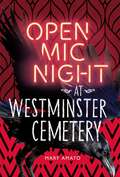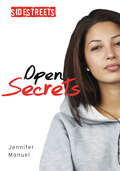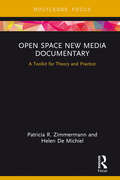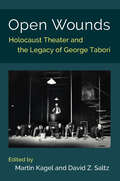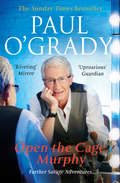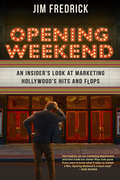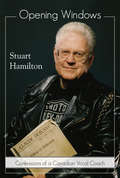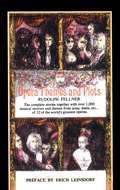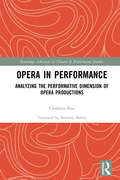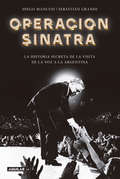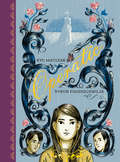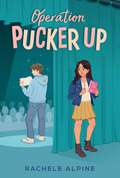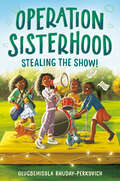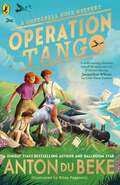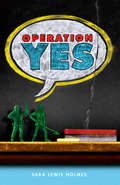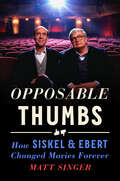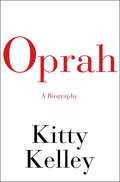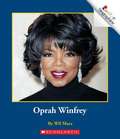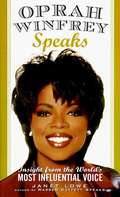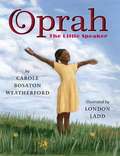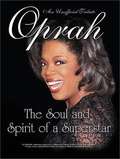- Table View
- List View
Open Mic Night at Westminster Cemetery
by Mary AmatoWhen Lacy wakes up dead in Westminster Cemetery, final resting place of Edgar Allan Poe, she's confused. It's the job of Sam, a young soldier who died in 1865, to teach her the rules of the afterlife and to warn her about Suppression—a punishment worse than death. Lacy desperately wants to leave the cemetery and find out how she died, but every soul is obligated to perform a job. Given the task of providing entertainment, Lacy proposes an open mic, which becomes a chance for the cemetery's residents to express themselves. But Lacy is in for another shock when surprising and long-buried truths begin to emerge.
Open Secrets (Lorimer SideStreets)
by Jennifer ManuelSeventeen-year-old Ana Santos has ambitions to make it big in music. When she signs a contract with the owner of a music café, she has no idea there are sexual strings attached. This book looks at the darker side of the music industry, including sexual harassment, lyrics that degrade and demean women, and social media trolling as backlash for speaking up. Ana is a strong, realistic main character who overcomes her feelings of shame to find a voice for herself and her music. The #MeToo movement has revealed the prevalence of sexual assault in society, and an issue that also affects the lives of teen girls. Distributed in the U.S by Lerner Publishing Group
Open Space New Media Documentary: A Toolkit for Theory and Practice (Routledge Studies in Media Theory and Practice)
by Patricia R. Zimmermann Helen De MichielOpen Space New Media Documentary examines an emerging and significant area of documentary practice in the twenty-first century: community-based new media documentary projects that move across platforms and utilize participatory modalities. The book offers an innovative theorization of these collaborative and collective new media practices, which the authors term "open space," gesturing towards a more contextual critical nexus of technology, form, histories, community, convenings, collaborations, and mobilities. It looks at a variety of low cost, sustainable and scalable documentary projects from across the globe, where new technologies meet places and people in Argentina, Canada, India, Indonesia, Peru, South Africa, Ukraine, and the USA.
Open Wounds: Holocaust Theater and the Legacy of George Tabori
by David Z. Saltz Martin KagelThis volume collects original essays on Hungarian-German playwright and screenwriter George Tabori (1914–2007) and his remarkable contributions to the stage. Tabori, a Jewish refugee and a truly transnational author, was best known for his work in New York theater that irreverently explored the Jewish experience, particularly the Holocaust. Although his illustrious career spanned a century, two continents, several languages, and a variety of literary genres, Tabori’s work has received scant attention in American letters, in spite of its significance for U.S. theater and Holocaust studies. Until Tabori, most dramas about the Holocaust were either rooted in American domestic realism, striving to create a strong empathetic connection between the audience and Holocaust victims, or featured an unembellished documentary style. Tabori staked out a third position, beyond realism and documentation. The volume brings together the voices of international scholars to provide a comprehensive introduction to Tabori’s theater as well as in-depth analyses of his work, discussing all of his major plays. Individual essays address Tabori’s postdramatic theater in relation to sacrificial ritual, performance studies, and post-humanist approaches to the contemporary stage, as well as performance aspects of his productions, questions of ethics and aesthetics raised by his theater, and his plays’ relation to Holocaust representation in popular culture.
Open Wounds: Holocaust Theater and the Legacy of George Tabori
by David Z. Saltz Martin KagelThis volume collects original essays on Hungarian-German playwright and screenwriter George Tabori (1914–2007) and his remarkable contributions to the stage. Tabori, a Jewish refugee and a truly transnational author, was best known for his work in New York theater that irreverently explored the Jewish experience, particularly the Holocaust. Although his illustrious career spanned a century, two continents, several languages, and a variety of literary genres, Tabori’s work has received scant attention in American letters, in spite of its significance for U.S. theater and Holocaust studies. Until Tabori, most dramas about the Holocaust were either rooted in American domestic realism, striving to create a strong empathetic connection between the audience and Holocaust victims, or featured an unembellished documentary style. Tabori staked out a third position, beyond realism and documentation. The volume brings together the voices of international scholars to provide a comprehensive introduction to Tabori’s theater as well as in-depth analyses of his work, discussing all of his major plays. Individual essays address Tabori’s postdramatic theater in relation to sacrificial ritual, performance studies, and post-humanist approaches to the contemporary stage, as well as performance aspects of his productions, questions of ethics and aesthetics raised by his theater, and his plays’ relation to Holocaust representation in popular culture.
Open the Cage, Murphy!: Hilarious tales of the rise of Lily Savage
by Paul O'GradyTHE SUNDAY TIMES BESTSELLER'With typical razor-sharp wit and candour, Paul tells of his rise to fame as Lily Savage . . . Riveting.' Daily MirrorFrom Britain's most beloved TV star, Open the Cage, Murphy is an action-packed roller-coaster ride through a decade of Paul O'Grady's life, stuffed full to the gunwales with hilarious stories, extreme situations and outrageous one-liners.A must read for any Paul O'Grady fan, Open the Cage, Murphy follows his brilliant comic creation Lily Savage as she embraces success and world domination beckons.From being involved in a plane crash, to getting caught up in the LA riots and a close encounter with Madonna, the stories come thick and fast. Paul takes us with him to a gay-themed weekend in Butlin's in Skegness, on a rowdy tour with Prisoner Cell Block H - the Musical and into the depths of the Australian rainforest, where he befriends a rare bird that can disembowel a man with a single kick. The dramatis personae include a family of dolphins, Charlton Heston and the ghost of Joan of Arc - and there's a starring role for a certain remarkable dog, Buster Elvis Savage.But whether he's writing about star-studded Hollywood parties, the devastating loss of close friends to AIDS, or late night shenanigans at the end of Blackpool Pier, Paul's wit and humanity never desert him.Open the Cage, Murphy is a genuine delight - all the more so for being delightfully genuine.Readers love Open the Cage, Murphy!'I couldn't put it down . . . Paul comes across as a very intelligent man . . . with a heart of gold under that naughty exterior.' *****'This is such a great read, Paul is excellent when describing things makes you feel as though you are there with him. His humour warmth and caring comes out in abundance.' *****'An excellent read. He takes you through the highs and lows of his life, you laugh and cry with him.' *****
Opening Weekend: An Insider's Look at Marketing Hollywood's Hits and Flops
by Jim FredrickIn a world where movie marketers are the stars of the story, Opening Weekend: An Insider's Look at Marketing Hollywood's Hits and Flops recounts Jim Fredrick’s journey through the realm of movie marketing. Fredrick offers readers exclusive access to behind-the-scenes anecdotes and firsthand accounts of working with studio executives and navigating relationships with famous movie stars and directors.After starting his career in 1983 as a trailer editor and producer at famed advertising boutique Intralink, Jim Fredrick went on to serve as president of marketing at Castle Rock Entertainment; senior vice president of creative advertising at Warner Bros.; and executive vice president of marketing at Sony Screen Gems. In 2011, he founded his own company, Jim Fredrick Motion Picture Marketing. Across a span of thirty-five years, Fredrick’s roles as a trailer maker and studio executive allowed him to craft advertising campaigns for a range of movies, from such iconic cinematic gems as The Shawshank Redemption to the widely beloved Harry Potter franchise, to commercial failures like The Adventures of Pluto Nash and Fired Up! Opening Weekend explores the intricacies of the lesser-known business of film distribution and marketing, unraveling the complex mechanisms through which movies are sold to discriminating audiences. Replete with triumphs, setbacks, and the relentless spirit that drives the creation and promotion of cinematic masterpieces, Opening Weekend promises an enthralling glimpse into the previously untold world of Hollywood movies.
Opening Windows: Confessions of a Canadian Vocal Coach
by Stuart Hamilton Lotfi MansouriA vocal coach who has been in the vanguard of classical music in Canada for more than six decades. Stuart Hamilton is a well-known Canadian musician who has been in the forefront of music in Canada for more than 60 years. Here, in this memoir, he recounts his sometimes hectic assault on the Canadian music world. Along the way, Hamilton encountered, as a vocal coach and accompanist, most of the great Canadian singers of the last half of the 20th century, and some international ones as well. For 27 years Hamilton was an erudite and funny personality on CBC’s Saturday Afternoon at the Opera. He has appeared across Canada with such beloved artists as Lois Marshall, Maureen Forrester, Richard Margison, and Isabel Bayrakdarian. In Opening Windows, Hamilton takes the reader into his confidence on numerous matters that have influenced musical life in Canada for decades.
Opera in Performance: Analyzing the Performative Dimension of Opera Productions (Routledge Advances in Theatre & Performance Studies)
by Clemens RisiOpera in Performance elucidates the performative dimension of contemporary opera productions. What are the most striking and decisive moments in a performance? Why do we respond so strongly to stagings that transform familiar scenes, to performers’ bodily presence, and to virtuosic voices as well as ill-disposed ones? Drawing on phenomenology and performance theory, Clemens Risi explains how these moments arise out of a dialogue between performers and the audience, representation and presence, the familiar and the new. He then applies these insights in critical descriptions of his own experiences of various singers, stagings, and performances at opera houses and festivals from across the German-speaking world over the last twenty years. As the first book to focus on what happens in performance as such, this study shifts our attention to moments that have eluded articulation and provides tools for describing our own experiences when we go to the opera. This book will particularly interest scholars and students in theater and performance studies, musicology, and the humanities, and may also appeal to operagoers and theater professionals.
Operación Sinatra: La historia secreta de la visita de La Voz a la Argentina
by Diego Mancusi Sebastián GrandiPara muchos, la visita de Frank Sinatra a la Argentina fue un fracaso económico de Palito Ortega, pero él no fue el único responsable del viaje de La Voz al país. También hubo un entramado político entre el gobierno militar, el de Ronald Reagan y la CIA. La historia recuerda a Palito Ortega como el único gestor de la visita de Frank Sinatra a la Argentina. Sin embargo, existió otro protagonista: Ricardo Finkel, quien en esta investigación ofrece su versión de los hechos y cuenta cuál fue el verdadero rol de Palito en el viaje de La Voz al país, más allá de las presentaciones en el Sheraton Hotel y el Luna Park. ¿Cómo fueron las negociaciones? ¿Era Sinatra un agente de la CIA? ¿Trajo un mensaje del presidente Ronald Reagan para el gobierno de facto argentino? ¿Quiénes eran las únicas personas que podían llamar directamente a su habitación? ¿Cómo engañaron los técnicos argentinos a los del cantante? ¿Amalita Fortabat colaboró económicamente? ¿Por qué Palito pidió ayuda al poder de turno? ¿Quiénes participaron en el festival anti-Sinatra? Todo el backstage de una visita que fue mucho más que una serie de recitales del más grande de todos los tiempos. Como dijo David Bowie, "la única razón por la que uno usa la figura de Sinatra para explicar de qué se trata sostener un personaje es que él es, más o menos, la única persona que lo ha conseguido. No es simplemente un actor o un cantante. Trasciende todas las áreas".
Operatic
by Kyo MaclearA story of friendship, first crushes, opera and the high drama of middle school told by award-winning Kyo Maclear in her debut graphic novel.Somewhere in the universe, there is the perfect tune for you.It’s almost the end of middle school, and Charlie has to find her perfect song for a music class assignment. But it’s hard for Charlie to concentrate when she can’t stop noticing her classmate Emile, or wondering about Luka, who hasn’t been to school in weeks. Then, the class learns about opera, and Charlie discovers the music of Maria Callas. The more she learns about Maria’s life, the more Charlie admires her passion for singing and her ability to express herself fully through her music. Can Charlie follow the example of the ultimate diva, Maria Callas, when it comes to her own life?Key Text Featuresspeech bubblescaptionsbibliographyCorrelates to the Common Core State Standards in English Language Arts:CCSS.ELA-LITERACY.RL.4.3Describe in depth a character, setting, or event in a story or drama, drawing on specific details in the text (e.g., a character's thoughts, words, or actions).CCSS.ELA-LITERACY.RL.6.3Describe how a particular story's or drama's plot unfolds in a series of episodes as well as how the characters respond or change as the plot moves toward a resolution.CCSS.ELA-LITERACY.RL.6.6Explain how an author develops the point of view of the narrator or speaker in a text.
Operation Pucker Up (mix)
by Rachele AlpineA girl and her friends enact a scheme to get her first kiss over with before she has to lock lips on stage for the school play in this charming middle grade rom-com in the spirit of Meg Cabot—now with a fresh new look!Prince Charming wakes Snow White with a kiss. My world came crashing down with two words. A kiss?! Grace Shaw just scored the coveted lead in her school play, Snow White, alongside James Lowe—her hot, popular Prince Charming. There&’s just one problem: they kiss at the end. And Grace has never been kissed before. Which means that Grace&’s role sounds more like her worst nightmare than a dream come true. So, Grace&’s two best friends propose Operation Pucker Up—a plan for Grace to score a kiss before opening night so she doesn&’t make a fool of herself in front of an audience. As if Grace isn&’t having a hard enough time, her estranged father suddenly reappears after leaving six months earlier. Her mom and sister welcome Dad back with open arms, but Grace can&’t simply forgive and forget. With opening night fast approaching, Operation Pucker Up reaching ridiculous levels, and family drama teeming behind the scenes, Grace is beginning to think all this love stuff is way too complicated. Will she find a way to have her happily ever after—and seal it with a kiss—both onstage and off?
Operation Sisterhood: Stealing the Show!
by Olugbemisola Rhuday-PerkovichThe Operation Sisterhood series continues as the four sisters decide to put on a community musical! The creative sister Sunday is the director and writer, but she has lost her spark. Can she find her shine again before everyone calls it quits?"This ode to Black girlhood and the communities that serve them offers humor, tenderness, and charm." –Renée Watson, New York Times bestselling authorSisters Sunday, Bo, Lee, and Lil are four sisters from a patchwork family. Bonded by their love of music, these sisters formed a musical babysitting band business Operation Sisterhood that just planned the best garden wedding party their Harlem community has seen. Imaginative Sunday impulsively announces her next big community project—staging an original musical—everybody&’s counting on her, especially her sisters, Bo and the Twins, Lil and Lee. Then, disaster: Sunday has lost her creative mojo just when she most want to impress her new neighbor, TV star Talitha Thomas. Soon there will be more drama offstage than on!Can Bo and the Twins use what they learn about New York City communities past and present and their band babysitting business to help Sunday find her shine and her love of storytelling again? It&’s Operation Sisterhood to the rescue!Award-winning author Olugbemisola Rhuday-Perkovich delivers a heartwarming sequel to Operation Sisterhood. Includes a New York City map to follow along on the sisters' journey!
Operation Tango: The new mystery adventure from Strictly Come Dancing star Anton Du Beke
by Anton Du BekeSummer, 1941: London evacuees Harry and Rosie Morton are looking forward to a summer exploring the Lancashire coast with their new friends – and learning to tango as a surprise for Mum’s birthday.Until the twins learn two things: their awful cousin, Jasper, is coming to stay.Worse still: Dad is returning to the Western Front.Then a train journey changes everything and suddenly Harry and Rosie find themselves caught up in a treacherous plot. And, when no one believes their story, they realise they must summon all their courage to not only protect the war effort, but save lives closer to home too . . .With time running out, can the twins stop the crooks before it’s too late and have one last dance with Mum and Dad before he leaves for France?
Operation Yes
by Sara Lewis HolmesReady? Line UP! FALL IN! And you'll fall for this timely and generous novel set on an Air Force base during the Iraq War, about an amazing teacher and the students she inspires.No one in her sixth-grade class knows quite what to make of Ms. Loupe, with her short hair, her taped square "stage" on the floor, and the interest in improvisational theatre. After all, their school is on an Air Force base--a place that values discipline more than improv. But her students soon come to love her fresh approach; and when her dear brother goes missing in Afghanistan, and Ms. Loupe herself breaks down, they band together to support their teacher. What starts as a class fundraiser expands into a nationwide effort for all injured troops, and an amazing vision of community and hope.
Operational Images: From the Visual to the Invisual
by Jussi ParikkaAn in-depth look into the transformation of visual culture and digital aesthetics First introduced by the German filmmaker Harun Farocki, the term operational images defines the expanding field of machine vision. In this study, media theorist Jussi Parikka develops Farocki&’s initial concept by considering the extent to which operational images have pervaded today&’s visual culture, outlining how data technologies continue to develop and disrupt our understanding of images beyond representation.Charting the ways that operational images have been employed throughout a variety of fields and historical epochs, Parikka details their many roles as technologies of analysis, capture, measurement, diagramming, laboring, (machine) learning, identification, tracking, and destruction. He demonstrates how, though inextricable from issues of power and control, operational images extend their reach far beyond militaristic and colonial violence and into the realms of artificial intelligence, data, and numerous aspects of art, media, and everyday visual culture.Serving as an extensive guide to a key concept in contemporary art, design, and media theory, Operational Images explores the implications of machine vision and the limits of human agency. Through a wealth of case studies highlighting the areas where imagery and data intersect, this book gives us unprecedented insight into the ever-evolving world of posthuman visuality. Cover alt text: Satellite photo on which white title words appear in yellow boxes. Yellow lines connect the boxes.
Opposable Thumbs: How Siskel & Ebert Changed Movies Forever
by Matt SingerOnce upon a time, if you wanted to know if a movie was worth seeing, you didn&’t check out Rotten Tomatoes or IMDB.You asked whether Siskel & Ebert had given it &“two thumbs up.&”On a cold Saturday afternoon in 1975, two men (who had known each other for eight years before they&’d ever exchanged a word) met for lunch in a Chicago pub. Gene Siskel was the film critic for the Chicago Tribune. Roger Ebert had recently won the Pulitzer Prize—the first ever awarded to a film critic—for his work at the Chicago Sun-Times. To say they despised each other was an understatement.When they reluctantly agreed to collaborate on a new movie review show with PBS, there was at least as much sparring off-camera as on. No decision—from which films to cover to who would read the lead review to how to pronounce foreign titles—was made without conflict, but their often-antagonistic partnership (which later transformed into genuine friendship) made for great television. In the years that followed, their signature &“Two thumbs up!&” would become the most trusted critical brand in Hollywood.In Opposable Thumbs, award-winning editor and film critic Matt Singer eavesdrops on their iconic balcony set, detailing their rise from making a few hundred dollars a week on local Chicago PBS to securing multimillion-dollar contracts for a syndicated series (a move that convinced a young local host named Oprah Winfrey to do the same). Their partnership was cut short when Gene Siskel passed away in February of 1999 after a battle with brain cancer that he&’d kept secret from everyone outside his immediate family—including Roger Ebert, who never got to say goodbye to his longtime partner. But their influence on in the way we talk about (and think about) movies continues to this day.
Oprah
by Kitty KelleyBased on three years of research and reporting as well as 850 interviews with sources, many of whom have never before spoken for publication, Oprah is the first comprehensive biography of one of the most influential, powerful, and admired public figures of our time, by the most widely read biographer of our era. Anyone who is a fan of Oprah Winfrey or who has followed her extraordinary life and career will be fascinated and newly informed by the closely observed, detailed, and well-rounded portrait of her provided by Kitty Kelley's exhaustively researched book. Readers will come away with a greater appreciation of who Oprah really is beyond her public persona and a fuller understanding of her important place in American cultural history.
Oprah Winfrey
by Wil MaraThe Rookie Biographies series features historical and contemporary people who will captivate emergent readers. Each biography introduces readers to the lives and achievements of pioneering men and women from diverse cultures, eras, and fields. Featuring simple text and full-color photographs, a "Words You Know" glossary, and an easy-to-use index, this series helps readers get to know the people who shaped our world. In this title, young readers will learn about Oprah Winfrey's rags to riches story. Discover how Winfrey grew up in poverty but, while attending college, discovered her talent as a news reporter and talk show host. Now, Winfrey's show is one of the most watched on daytime television, she owns a production company, and publishes a magazine.
Oprah Winfrey Speaks: Insight from the World's Most Influential Voice
by Janet LoweOprah is not just another famous entertainer. She's a friend to the world and a role model for all people, of any gender, of any race, of any group. Before reading Oprah Winfrey Speaks, here are some guidelines on what to expect from the book. It will not be focused on the well-known details of Oprah's life and rise to stardom, although this information is presented to give the reader a better perspective on the comments. Rather, the book emphasizes the lessons that Winfrey has learned along the way--lessons many of us can profit from. Oprah has taught us a lot, and I've tried to capture as much of that wisdom as possible.
Oprah Winfrey: The Real Story
by George MairAn exploration of the life and career of Oprah Winfrey.
Oprah: The Little Speaker
by Carole Boston WeatherfordThe first six years in the life of the world's most popular talk show host and how she overcame adversity to believe in her dreams.
Oprah: The Soul and Spirit of a Superstar
by Larry MayerA thousand years from now when historians examine our culture, they won't find a more classic tale of living the American Dream than Oprah Winfrey. Born to an unwed mother in tiny Kosciusko, Miss., and sexually abused at the age of 9, Winfrey has defeated astronomical odds to become the richest, most powerful and most influential woman on American television.
